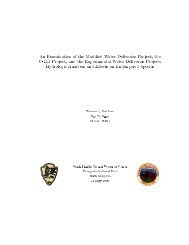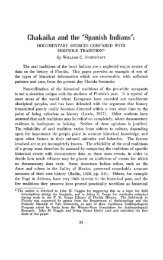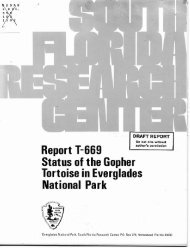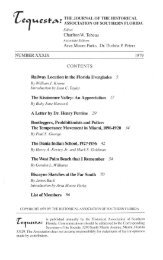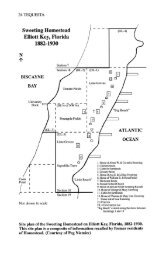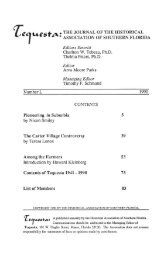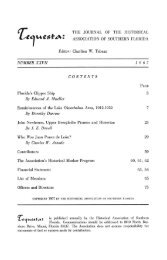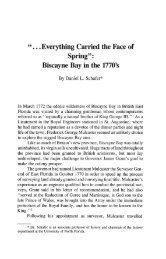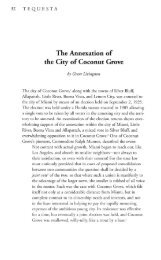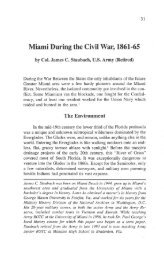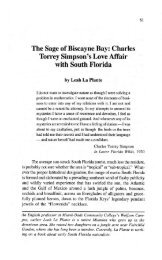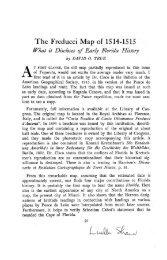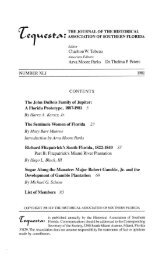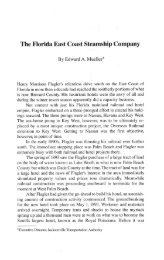Notes on the Passage Across the Everglades - FIU Digital Collections
Notes on the Passage Across the Everglades - FIU Digital Collections
Notes on the Passage Across the Everglades - FIU Digital Collections
You also want an ePaper? Increase the reach of your titles
YUMPU automatically turns print PDFs into web optimized ePapers that Google loves.
"<str<strong>on</strong>g>Notes</str<strong>on</strong>g> <strong>on</strong> <strong>the</strong> <strong>Passage</strong> <strong>Across</strong> <strong>the</strong> <strong>Everglades</strong>"<br />
THE NEWS - St. Augustine: January 8, 1841<br />
This an<strong>on</strong>ymous author tells <strong>the</strong> story of <strong>the</strong> raid led by Col<strong>on</strong>el William<br />
S. Harney from Fort Dallas to <strong>the</strong> Mouth of <strong>the</strong> Miami River across <strong>the</strong> <strong>Everglades</strong><br />
to Chakaika's Island. The raid and <strong>the</strong> killing of Chief Chakaika who<br />
had participated in a raid <strong>on</strong> Harney's post <strong>on</strong> <strong>the</strong> Caloosahatchee River <strong>on</strong><br />
July 23, 1839, are well known. (See: Tequesta, Number Nine, 1949, Oliver<br />
Griswold, "William S. Harney: Indian Fighter.", and Tequesta, Number XIII,<br />
William C. Sturtevant, "Chakaika and <strong>the</strong> Spanish Indians".) This day by day<br />
report of <strong>the</strong> expediti<strong>on</strong>'s activities adds <strong>on</strong>ly a few details to <strong>the</strong> known story<br />
of <strong>the</strong> encounter with Chakaika's band. But it is possibly <strong>the</strong> earliest account<br />
of a journey across <strong>the</strong> watery wilderness by a modern white man. The Indians<br />
had l<strong>on</strong>g been able to navigate <strong>the</strong> shallow winding channels with <strong>the</strong> shallow<br />
draft dugout canoes. Harney used canoes and Indian guides to follow <strong>the</strong> red<br />
man to his last hiding place. The island is located just south of <strong>the</strong> Tamiami<br />
Trail <strong>on</strong> <strong>the</strong> western edge of <strong>the</strong> <strong>Everglades</strong> near <strong>the</strong> Dade-M<strong>on</strong>roe County line.<br />
(EDITOR'S NOTE).<br />
Col<strong>on</strong>el Harney, 2nd Drago<strong>on</strong>s, with Capt. Davids<strong>on</strong>, Lieuts. Rankin<br />
and Ord, 3rd Artillery, Dr. Russell, and myself, started from Fort Dallas with<br />
90 men, and sixteen canoes. We left <strong>on</strong> <strong>the</strong> 4th of December, at night, and<br />
proceeded up <strong>the</strong> left pr<strong>on</strong>g of <strong>the</strong> Miami River. The night was very dark<br />
and rainy, and we met with c<strong>on</strong>siderable difficulty in ascending <strong>on</strong> account<br />
of <strong>the</strong> rapidity of <strong>the</strong> current and <strong>the</strong> shoal and rocky bed of <strong>the</strong> river. About<br />
a mile above <strong>the</strong> forks we came to a body of high saw grass, this c<strong>on</strong>tinued<br />
for about a mile and a half, when we came in open view of <strong>the</strong> <strong>Everglades</strong>,<br />
and <strong>the</strong> grass became more scattered. The pine barren was kept close <strong>on</strong> our<br />
left, until we came to a small island <strong>on</strong> our left, when our course became<br />
more westerly; thus we c<strong>on</strong>tinued until distant about eight miles from <strong>the</strong><br />
mouth of <strong>the</strong> river, when Capt. Davids<strong>on</strong> becoming separated from us we<br />
halted to <strong>the</strong> leeward of an island which was entirely overflowed, and waited<br />
until he came up, where <strong>the</strong> night was passed in our open boats. It c<strong>on</strong>tinued<br />
to rain nearly all night, and our situati<strong>on</strong> was anything but comfortable.<br />
Dec. 5- By daylight this morning we were up and at it with our<br />
paddles; our course was generally West-South-West, but this we varied<br />
according to <strong>the</strong> directi<strong>on</strong> of <strong>the</strong> channels, and our depth of water, till about<br />
1 o'clock; <strong>the</strong> men being very much fatigued, haveing had to pull <strong>the</strong>ir<br />
boats through <strong>the</strong> mud and grass a greater part of <strong>the</strong> way, we insisted <strong>on</strong><br />
57
58 TEQUESTA<br />
John, our guide, carrying us to some high land, where we might encamp and<br />
give <strong>the</strong> men a little rest. The officers had almost lost c<strong>on</strong>fidence in his<br />
knowledge of <strong>the</strong> country, as at <strong>on</strong>e time he could not tell us in which directi<strong>on</strong><br />
<strong>the</strong> sun rose; and as we c<strong>on</strong>cluded not to follow him in <strong>the</strong> directi<strong>on</strong><br />
he was going any l<strong>on</strong>ger, he insisted that he was right, and that his object<br />
was to carry us where he could find <strong>the</strong> greatest depth of water, and that he<br />
could carry us a nearer way, but it was very shoal; which proved in <strong>the</strong> end<br />
to be correct, as he had not g<strong>on</strong>e more than a few miles when it was with<br />
<strong>the</strong> greatest difficulty, we could move <strong>the</strong> boats. The Col<strong>on</strong>el called to him<br />
to stop, as he would go no fur<strong>the</strong>r in that directi<strong>on</strong>; but he insisted that <strong>the</strong><br />
island was not more than a mile distant, and <strong>the</strong> Col<strong>on</strong>el suffered him to<br />
proceed. Sure enough, c<strong>on</strong>trary to <strong>the</strong> expectati<strong>on</strong>s of us all, he in a short<br />
time halted at a low tuft of bushes, about half a mile in circumference, which<br />
seemed to us all to be entirely flooded with water, but after penetrating about<br />
300 yeards, we came to a magnificent little spot in its centre, about 150 yeards<br />
in circumference, here we found an old Indian camp which evidently had<br />
been deserted for some m<strong>on</strong>ths. It was encircled by a number of shrubs of<br />
<strong>the</strong> wild Pappaw; and two large and curious wild fig trees, about ten feet<br />
apart, decorated its centre. This is a remarkable tree; it first makes its<br />
appearance as <strong>the</strong> creeper, and seizes <strong>on</strong> <strong>the</strong> largest tree it can find, c<strong>on</strong>tinuing<br />
to encircle it in its meshes until it deprives it of life, when it feeds up<strong>on</strong> <strong>the</strong><br />
decayed matter and becomes a beautiful tree. These had each attacked a<br />
palmetto and <strong>on</strong>e of <strong>the</strong>m was dead, but <strong>the</strong> top of <strong>the</strong> o<strong>the</strong>r was still blooming<br />
in <strong>the</strong> centre, although completely surrounded. We hailed, with a great<br />
deal of pleasure, <strong>the</strong> touch of dry land, as we were wet to <strong>the</strong> skin; it having<br />
rained all day, and <strong>the</strong> wind blowing from <strong>the</strong> North. As so<strong>on</strong> as it became<br />
dark, we kindled a large fire-dried ourselves-got a good supper, eat it with<br />
a great deal of gussto-talked over what we had underg<strong>on</strong>e, and what we<br />
intended to do-stretched ourselves <strong>on</strong> our blankets and slept soundly and<br />
sweetly, till daylight warned us to be up and a doing.<br />
Dec. 6 - After getting some hot coffee, again started <strong>on</strong> our course. The<br />
day has cleared off beautifully, and we are moving slowly and silently al<strong>on</strong>g,<br />
in momentary expectati<strong>on</strong> of falling in with some Indian canoes. John can<br />
see from <strong>the</strong> top of a tree <strong>the</strong> field from which he escaped, and we expect to<br />
have a devil of a fight when we get <strong>the</strong>re. Nothing now presents itself to view<br />
except <strong>on</strong>e boundless expanse of saw-grass and water, occasi<strong>on</strong>ally interspersed<br />
with little islands, all of which are overflowed, but <strong>the</strong> trees are in a<br />
green and flourisheing state. No country that I have ever heard of bears any
TEQUESTA 59<br />
resemblance to it; it seems like a vast sea, filled with grass and green trees,<br />
and expressly intended as a retreat for <strong>the</strong> rascally Indians, from which<br />
<strong>the</strong> white man would never seek to drive <strong>the</strong>m. We have plenty of water at<br />
present, and go al<strong>on</strong>g with a great deal of ease. We reached <strong>the</strong> island, as<br />
expected at about 12 o'clock. When we came in sight, <strong>the</strong> Col<strong>on</strong>el took four<br />
canoes, with Lieut. Rankin, and went ahead, having first painted and dressed<br />
himself and men so much like Indians, that <strong>the</strong>y could scarcely <strong>the</strong>mselves<br />
detect <strong>the</strong> impositi<strong>on</strong>. He directed Lieut. Ord to follow with <strong>the</strong> rest of <strong>the</strong><br />
canoes, and Capt. Davids<strong>on</strong>, as he was unwell, to remain behind with <strong>the</strong><br />
large boats. I was in <strong>the</strong> next canoe to Lieut. Ord, who, as he was turning to<br />
give some order to his men, lost his balance, and such a pretty summerset<br />
"I never did see;" he carried boat, provisi<strong>on</strong>s, ammuniti<strong>on</strong>, and guns all with<br />
him. When his head appeared <strong>on</strong> <strong>the</strong> surface of <strong>the</strong> water, he said to me,<br />
"go ahead with <strong>the</strong> boats;" I inserted my handkerchief in my mouth and<br />
evaporated. The order was to keep just in sight of <strong>the</strong> Col<strong>on</strong>el, and, in case<br />
he should not be able to manage <strong>the</strong> force <strong>on</strong> <strong>the</strong> island, to come to his assistance;<br />
but <strong>the</strong> delay threw me behind, and I so<strong>on</strong> lost sight of, and with <strong>the</strong><br />
greatest difficulty found, <strong>the</strong> island. We had to wade through mud and water<br />
three or four hundred yeards, up to our waists, before we gained dry land;<br />
here we found a corn field of about an acre, and <strong>the</strong> richest land I have ever<br />
seen, being <strong>on</strong>e black heap of soil of endless depth. This island is called<br />
from <strong>the</strong> Indian name of <strong>the</strong> wild fig, "Ho-co-mo-thlocco." It being early we<br />
did not remain here l<strong>on</strong>g, but pushed <strong>on</strong> to ano<strong>the</strong>r island, about seven miles<br />
distant, <strong>the</strong> usual stopping place of <strong>the</strong> Indian, when <strong>the</strong>y visit Sam J<strong>on</strong>es,<br />
or go from his camp to <strong>the</strong> Spanish Indians; we arrived early in <strong>the</strong> evening;<br />
and had to wade 200 yeard before we gained a footing; we found here signs<br />
of a few days old, where <strong>the</strong>y had been cutting bushes. I ascended <strong>the</strong> top<br />
of a fig tree with John, and he pointed out to me our course, and <strong>the</strong> directi<strong>on</strong><br />
of <strong>the</strong> different islands. We could see, far to <strong>the</strong> South, <strong>the</strong> pine barren<br />
skirting <strong>the</strong> <strong>Everglades</strong>, and <strong>the</strong> tops of <strong>the</strong> grass and bushes burnt to make<br />
out <strong>the</strong> trail. The island, Ho-co-mo-thlocco, bears about East-South-East<br />
from this, and <strong>the</strong> island where we go to-morrow, about South-West and by<br />
South. This island is called "Efa-noc-co-chee," from a dog having died which<br />
was left here; it c<strong>on</strong>tains about half an acre of cleared land, but has never<br />
been cultivated, and is used al<strong>on</strong>e as a camp ground.<br />
7 Dec. - Off again; our course for a short distance was about north,<br />
<strong>the</strong>n changed it to north west, and c<strong>on</strong>tinued in this directi<strong>on</strong> until we reached<br />
ano<strong>the</strong>r Island, which is called Cochokeynchajo, from <strong>the</strong> name of an Indian
60 TEQUESTA<br />
who cleared and cultivated it. It is distant from Efanoccochee about six miles,<br />
and its course is about north west. We found <strong>on</strong> this Island, <strong>the</strong> figure of an<br />
Indian drawn <strong>on</strong> a tree, and <strong>the</strong> figures S and 9. Which is <strong>the</strong> first indicati<strong>on</strong><br />
of a white man's being am<strong>on</strong>g <strong>the</strong>m. Being early when we arrived here, <strong>the</strong><br />
Col<strong>on</strong>el, c<strong>on</strong>trary to <strong>the</strong> oppini<strong>on</strong> of <strong>the</strong> guide, determined not to remain here<br />
until night, but took Lieut. Ord ahead with him, and two canoes, to surprise<br />
<strong>the</strong> next Island. Following <strong>on</strong> with <strong>the</strong> rest of <strong>the</strong> boats, we had not g<strong>on</strong>e<br />
more than a mile, when we lost <strong>the</strong> trail of <strong>the</strong>ir boats, and c<strong>on</strong>tinued to<br />
wander to every point of <strong>the</strong> compass until late in <strong>the</strong> evening, when we made<br />
out to reach <strong>the</strong> Island from which we started about sun-set, and found John,<br />
who had returned for us. C<strong>on</strong>sidered ourselves very fortunate to reach this<br />
Island again, as we could not follow with any certainty our trails for <strong>on</strong>e<br />
hundred yards. To <strong>the</strong> westward of this Island, <strong>the</strong> main body of water seems<br />
to change its course, and flow with some current to <strong>the</strong> Northwest, which<br />
induces us to think we were in <strong>the</strong> centre of <strong>the</strong> <strong>Everglades</strong>. It was late at<br />
night when we reached <strong>the</strong> Island, where Lieut. Ord had g<strong>on</strong>e. But not withstanding<br />
<strong>the</strong> thousand channels which flowed and wound in every directi<strong>on</strong>,<br />
and although it was so dark that we could not distinguish land from water,<br />
John never <strong>on</strong>ce missed <strong>the</strong> track. Found <strong>on</strong> this Island, which is called by its<br />
owner Intaska, a large hut built of cypress bark, and under it a bed made<br />
of boards, coming in play very timely and was quickly appropreiated. It is<br />
<strong>the</strong> largest and richest Island we have yet seen, and <strong>the</strong> various vegetables<br />
growing <strong>on</strong> it, such as pumpkins, beans, corn, &tc.; and deer tracks were<br />
very numerous. Its course from Cochokeynchajo, N.N.West.<br />
8 Dec. - We shall remain <strong>on</strong> Intaska until 4 o'clock this evening, when<br />
we will proceed to ano<strong>the</strong>r Island which bears north 100 West from this,<br />
where we expect to surprise some Indians, as we can now see a large smoke in<br />
that directi<strong>on</strong>. When we visit this, our course will <strong>the</strong>n change to <strong>the</strong> southward,<br />
and we will make for <strong>the</strong>ir str<strong>on</strong>g holds <strong>on</strong> <strong>the</strong> sea board.<br />
9th Dec. - Yesterday about 12 o'clock when some were asleep and all<br />
silent, awaiting <strong>the</strong> time of starting, <strong>the</strong> Col<strong>on</strong>el called out from <strong>the</strong> top of<br />
a tree, that two canoes were approaching <strong>the</strong> Island <strong>on</strong> <strong>the</strong> south side. In a<br />
moment, all were up with <strong>the</strong>ir guns in hand; <strong>the</strong> boats were silently approaching,<br />
and we being <strong>on</strong> <strong>the</strong> o<strong>the</strong>r side, Lieut. Rankin was immediately<br />
ordered to man four canoes, and move slowly al<strong>on</strong>g to meet <strong>the</strong>m. The grass<br />
was so high that <strong>the</strong> Indians did not discover him until within a few hundred<br />
yeards, when <strong>the</strong>y immediately wheeled <strong>the</strong>ir canoes and made off with all<br />
<strong>the</strong>ir strength. But <strong>the</strong>re was no eluding our snake-like boats, and our tried
TEQUESTA 61<br />
soldiers. They made <strong>the</strong> boats fairly jump out of <strong>the</strong> water. When within<br />
short distance, and seeing <strong>the</strong> Indians approaching a deep body of saw grass,<br />
our soldiers commenced a running fire, and so<strong>on</strong> disabled <strong>on</strong>e of <strong>the</strong> men and<br />
overhauled him. The boats halted at <strong>the</strong> saw grass and <strong>the</strong> Indians leaped out;<br />
but our men were as quick as <strong>the</strong>y were, and pursued <strong>the</strong>m through it for<br />
some distance to a p<strong>on</strong>d, where <strong>the</strong>y disabled ano<strong>the</strong>r, and accidently<br />
wounded a squaw, who was endeavoring to escape with her child <strong>on</strong><br />
her back. In ano<strong>the</strong>r directi<strong>on</strong>, <strong>the</strong>y overhauled a squaw with a girl about<br />
12 years old, and two small children; making in all, eight pers<strong>on</strong>s. N<strong>on</strong>e<br />
of <strong>the</strong>m were killed; and as so<strong>on</strong> as we could get <strong>the</strong>m through <strong>the</strong> mud to<br />
<strong>the</strong> boats, we returned. Col. Harney was looking <strong>on</strong> at <strong>the</strong> race from <strong>the</strong> top<br />
of a tree, and made <strong>the</strong> Island ring with his cheering. As so<strong>on</strong> as Lieut.<br />
Rankin started, I got a canoe and followed <strong>on</strong> and joined in <strong>the</strong> pursuit, but<br />
did get up before <strong>the</strong>y had got into <strong>the</strong> grass. When we returned to <strong>the</strong><br />
Island, <strong>the</strong> Col<strong>on</strong>el ordered rope to be made ready, and swung <strong>the</strong> two warriors<br />
to <strong>the</strong> top of a tall tree, where <strong>the</strong>y now hang, "darkly painted <strong>on</strong> <strong>the</strong><br />
crims<strong>on</strong> sky." The Indians report that Chakika is <strong>on</strong> an Island five miles<br />
from this with a str<strong>on</strong>g force, and we will start about dark to attack him.<br />
Captain Davids<strong>on</strong> has been sick ever since we started, and he is now so ill<br />
that it is feared we will have to return <strong>on</strong> his account.<br />
10th Dec. - The squaw is dead: she died about 12 o'clock, and we buried<br />
her <strong>on</strong> <strong>the</strong> Island. Shortly after, <strong>the</strong> o<strong>the</strong>r squaw reported that ano<strong>the</strong>r party<br />
was coming <strong>on</strong> <strong>the</strong> same tract that <strong>the</strong>y came. The Col<strong>on</strong>el sent out Lieuts.<br />
Rankin and Ord, (I accompanying,) to intercept <strong>the</strong>m, but after waiting until<br />
nearly sun-set, we had to return without meeting any of <strong>the</strong>m. As so<strong>on</strong> as<br />
<strong>the</strong> sun went down, <strong>the</strong> camp was broken up, and we were again <strong>on</strong> <strong>the</strong> water.<br />
The night was very dark and rainy, and <strong>the</strong> guide could, with <strong>the</strong> greatest<br />
difficulty, keep in <strong>the</strong> trail. When we were within a few miles of <strong>the</strong> Island,<br />
<strong>the</strong> Col<strong>on</strong>el sent Lieuts. Rankin and Ord ahead to surprise <strong>the</strong> Island. They<br />
did not reach it until some time after sun-rise; but such was <strong>the</strong> c<strong>on</strong>fidence of<br />
<strong>the</strong> Indians in <strong>the</strong>ir own security, that our party were not discovered until<br />
<strong>the</strong>y had crept up into <strong>the</strong>ir camp, and commenced firing. One warrior was<br />
shot dead, and two warriors, <strong>on</strong>e boy, and five squaws and children taken<br />
pris<strong>on</strong>ers. Chakika, who was chopping wood, threw down his axe and ran<br />
off howling; but his hour had come; not withstanding his herculean strength,<br />
he could not escape. Hall, <strong>on</strong>e of <strong>the</strong> Drago<strong>on</strong>s, pursued him al<strong>on</strong>e when<br />
all <strong>the</strong> men were exhausted, fired and killed him, took his scalp, and returned.<br />
Two warriors excaped, and Lieut. Ord discovering <strong>the</strong>ir trail, pursued <strong>the</strong>m
62 TEQUESTA<br />
to ano<strong>the</strong>r Island, about four miles distant, where <strong>the</strong>re were a number of<br />
squaws and three or four warriors. On his approach, <strong>the</strong> Indians hoisted a<br />
white flag, and called to John to come up and talk; but while he was approaching<br />
with Lieut. Ord, he was shot through <strong>the</strong> thigh, and at <strong>the</strong> same<br />
time <strong>on</strong>e of <strong>the</strong> Drago<strong>on</strong>s, (Allen) was dangerously wounded in <strong>the</strong> thigh,<br />
and Turner in <strong>the</strong> leg. A great number of balls were fired at Lieut. Ord, but<br />
n<strong>on</strong>e struck him, In approaching, <strong>the</strong> men had to wade about two miles in<br />
water and mud up to <strong>the</strong>ir hips; and when <strong>the</strong>y came up, were so much<br />
exhausted and <strong>the</strong> guns nearly all wet, that <strong>the</strong>y had to retire under <strong>the</strong> cover<br />
of a small scrub, about four hundred yards distant. When Col. Harney heard<br />
<strong>the</strong> firing, he sent Lieut. Rankin and myself with two canoes, to his assistance,<br />
and when we had got in about a mile of Lieut. Ord, we met John all<br />
bloody, who reported that <strong>on</strong>e man was killed, and that <strong>the</strong>y were firing<br />
rapidly, and that we could not approach with our canoes. We immediately<br />
jumped out and hastened forward as rapid as we could through <strong>the</strong> deep<br />
mud and water. When we got up. Lieut. Rankin attempted to charge with<br />
his men, but three of <strong>the</strong>m were wounded at <strong>the</strong> first fire, and he was forced<br />
to retire and await <strong>the</strong> arrival of Col. Harney. The balls flew thick around<br />
our heads, and <strong>the</strong> Indians behaved with a great deal of coolness. Their<br />
object of firing was to give <strong>the</strong> squaws time to escape. When Col<strong>on</strong>el Harney<br />
came up, we charged <strong>the</strong> Island, but <strong>the</strong>y had all escaped from <strong>the</strong> back part,<br />
and taken off most of <strong>the</strong>ir plunder. The circumstance was very unfortunate<br />
to <strong>the</strong> expediti<strong>on</strong>, as <strong>the</strong> Indians who escaped communicated <strong>the</strong> intelligence<br />
to <strong>the</strong> o<strong>the</strong>r Islands, and put <strong>the</strong>m <strong>on</strong> <strong>the</strong>ir guard. Shortly after our return<br />
to Chakika's Island, a canoe was seen approaching with two Indians in it.<br />
The Col<strong>on</strong>el immediatley despatched Lieut. Rankin with two canoes, to<br />
pursue <strong>the</strong>m; but, before he got up <strong>the</strong>y had got up. They had approached<br />
and taken an Indian or Spaniard, who was c<strong>on</strong>cealed in <strong>the</strong> high grass and<br />
hastened off. - Lieut. Rankin pursued <strong>the</strong>m closely for about three miles,<br />
and gained <strong>on</strong> <strong>the</strong>m so closely that a rifle was fired by <strong>the</strong> Indians, and <strong>the</strong><br />
ball passed very near Lieut. R. Unfortunately <strong>the</strong> boat disappeared, and <strong>the</strong><br />
guns all got wet, and <strong>the</strong> pursuit was disc<strong>on</strong>tinued. We are now laying here<br />
to give <strong>the</strong> men some rest, as <strong>the</strong>y have almost all given out, having been in<br />
hot pursuit for several days. Col. Harney went out about half and hour ago<br />
after Chakika's body, and discovering a sail approaching, he hid his canoes<br />
in <strong>the</strong> grass until <strong>the</strong>y came up, and captured <strong>on</strong>e warrior and six squaws<br />
and children - which makes our whole number of killed and captured,<br />
twenty-five. We have now crossed <strong>the</strong> l<strong>on</strong>g fabled and unknown <strong>Everglades</strong>, at<br />
least as far as we can go in boats in this directi<strong>on</strong>. A large cypress swamp
TEQUESTA 63<br />
extends for many miles al<strong>on</strong>g <strong>the</strong> border, running north-east and south-west<br />
<strong>the</strong> great resort for <strong>the</strong> Indians, where <strong>the</strong>y build <strong>the</strong>ir canoes. This evening,<br />
<strong>the</strong> Col<strong>on</strong>el had our two pris<strong>on</strong>ers exalted to <strong>the</strong> top of <strong>on</strong>e of <strong>the</strong> lookout<br />
trees, with <strong>the</strong> body of Chakika by <strong>the</strong>ir side. We found in Chakika's camp<br />
a large quantity of plunder, c<strong>on</strong>sisting of cloths, linnens, calicoes, ready made<br />
clothing, all kinds of tools, powder, &c. &c.; and had an aucti<strong>on</strong> of <strong>the</strong>m which<br />
amounted to upwards of $200. The articles were stolen from Indian Key at<br />
<strong>the</strong> time of <strong>the</strong> massacre. We also got a fine barge, and a great quantity of<br />
co<strong>on</strong>ti.<br />
11th Dec.- Our tent or shed was pitched last night within a short distance<br />
of <strong>the</strong> tree <strong>on</strong> which Chakika was suspended. The night was beautiful,<br />
and <strong>the</strong> bright rising mo<strong>on</strong> displayed to my view as I lay <strong>on</strong> my bed, <strong>the</strong><br />
gigantic proporti<strong>on</strong>s of this <strong>on</strong>ce great and much dreaded warrior. He is<br />
said to have been <strong>the</strong> largest Indian in Florida, and <strong>the</strong> sound of his very<br />
name to have been a terror to his Tribe. We have am<strong>on</strong>g <strong>the</strong> captives, his<br />
mo<strong>the</strong>r, sister, and wife. Left Chakika's Island about 10 o'clock this morning<br />
and are now returning as far as Intaska, in a south-easterly directi<strong>on</strong>, when<br />
we will change our course to <strong>the</strong> south-west and make for <strong>the</strong> sea.<br />
12th Dec. - we c<strong>on</strong>tinued our course to <strong>the</strong> South-East until we passed<br />
Intaska, when we changed directi<strong>on</strong> <strong>on</strong>e point to <strong>the</strong> West of South, and<br />
encamped, at sunset, <strong>on</strong> an island of about three acres in extent. Met with<br />
nothing here except an innumerable host of mosquitoes. The sister of Chakika<br />
informed us that <strong>the</strong>re were three Spaniards in <strong>the</strong> <strong>Everglades</strong>, Who supplied<br />
<strong>the</strong> Indians with salt and ammuniti<strong>on</strong>; <strong>on</strong>e of <strong>the</strong>m, Domingo, advised <strong>the</strong>m<br />
to attack Indian Key, and insured <strong>the</strong>ir success. Started about 11 o'clock<br />
this morning in a South-West directi<strong>on</strong>, and had not g<strong>on</strong>e more than five miles<br />
when we approached a small island, <strong>on</strong> which we had no idea that <strong>the</strong>re were<br />
Indians, but <strong>on</strong> coming up we found a large yawl boat, killed two Indian men,<br />
and took <strong>on</strong>e squaw and seven children pris<strong>on</strong>er. Lieutenants Rankin and<br />
Ord hurried <strong>on</strong> to an island about two miles distant, where <strong>the</strong>y found a<br />
great number of palmetto huts, very well thatched, and a number of plantins<br />
and banana trees, but <strong>the</strong> Indians had g<strong>on</strong>e some time before. The squaw<br />
could talk English very well, and informed us that 4 women had g<strong>on</strong>e to an<br />
island, a short distance off, to dig potatoes, and <strong>the</strong> Col<strong>on</strong>el sent a Serjeant<br />
with a few men after <strong>the</strong>m, but could not find <strong>the</strong>m. We remained until 4<br />
o'clock in <strong>the</strong> evening, when we saw a boy approaching, who had been fishing;<br />
<strong>the</strong> boats laid in <strong>the</strong> grass until he came near, when <strong>the</strong>y came out took<br />
him without any resistance. Left a Sergeant, with two boats, at this island,
64 TEQUESTA<br />
to wait until <strong>the</strong> women came up, and we are now <strong>on</strong> our way to <strong>the</strong> next<br />
island, which is four or five miles distant. The island has turned out to be<br />
<strong>the</strong> town Lieut. Rankin visited this morning, and not more than two miles<br />
distant.<br />
13th Dec. - The morning has come, and <strong>the</strong> Sergeant returned without<br />
finding <strong>the</strong> squaw. The Col<strong>on</strong>el sent Lts. Rankin and Ord ahead, this morning,<br />
to an island which is almost in our course, and we are now following<br />
in a Sou<strong>the</strong>rly directi<strong>on</strong>. The day is rainy and disagreeable. We arrived in<br />
<strong>the</strong> evening at ano<strong>the</strong>r, where we encamped; and also passed <strong>on</strong>e <strong>on</strong> our way.<br />
14th Dec. - We have started again <strong>on</strong> our journey, and expect to reach<br />
<strong>the</strong> head of Shark River to-day; and to-morrow get a sight of <strong>the</strong> big water,<br />
Thank God, we w<strong>on</strong>'t have to wade to ano<strong>the</strong>r island, although <strong>the</strong>re are<br />
several in our way. The Indians may assault and give us a crack before we<br />
get out, which would annoy us very much in our present incumbered state.<br />
This is <strong>the</strong> prettiest day we have had since starting. I forgot to notice <strong>the</strong><br />
death of poor Allen, who was wounded, he died <strong>on</strong> <strong>the</strong> evening of <strong>the</strong> 11th,<br />
and, <strong>on</strong> <strong>the</strong> morning of <strong>the</strong> 12th, was buried <strong>on</strong> Chakika's island, with <strong>the</strong><br />
h<strong>on</strong>ors of war. He is <strong>the</strong> <strong>on</strong>ly <strong>on</strong>e of our party we have left in <strong>the</strong> glades<br />
as yet.<br />
15th Dec.- We reached <strong>the</strong> head of <strong>the</strong> river which <strong>the</strong> Indians call<br />
P<strong>on</strong>cha about 4 o'clock yesterday evening, and hailed it with three cheers.<br />
We have now accomplished what has never been d<strong>on</strong>e by white man. The<br />
head of <strong>the</strong> river was at first choked up with cane and weeds, but we had not<br />
g<strong>on</strong>e more than a mile when it opened out most beautifully into a broad and<br />
navigable river. C<strong>on</strong>tinued down it till late at night, but <strong>the</strong> guide losing<br />
his way, we encamped in our boats and waited till morning, when we went<br />
ashore <strong>on</strong> a high bluff, and got out breakfast. We shall reach <strong>the</strong> sea by 12.<br />
We have been twelve days and twelve nights crossing, Reached <strong>the</strong> mouth of<br />
<strong>the</strong> river about half after twelve. Its course was about West, and empties<br />
into <strong>the</strong> sea by two or three mouths. The bars are very shallow, and not<br />
navigable for steamboats. This is <strong>the</strong> <strong>on</strong>ly outlet of <strong>the</strong> water of <strong>the</strong> <strong>Everglades</strong><br />
<strong>on</strong> this side of <strong>the</strong> Peninsula. We did not remain l<strong>on</strong>g at <strong>the</strong> mouth,<br />
but rigged our sails and went <strong>on</strong> about sixteen miles and encamped <strong>on</strong> a<br />
point of <strong>the</strong> beach; here we caught a number of opposums, which seemed<br />
to be <strong>the</strong> <strong>on</strong>ly inhabitant. The sun set <strong>on</strong> <strong>the</strong> sea most beautifully, and threw<br />
its variegated rays over <strong>the</strong> dense forest of mangrove, which bounds <strong>the</strong><br />
whole coast.
TEQUESTA 65<br />
16th Dec. -We remained here until about 12 o'clock today and I<br />
amused myself collecting <strong>the</strong> beautiful shells which cover <strong>the</strong> beach. We<br />
reached Cape Sable, <strong>the</strong> most Sou<strong>the</strong>rn point of <strong>the</strong> Territory about 5<br />
o'clock, and <strong>the</strong> men are busied in building fires and forming <strong>the</strong> camp.<br />
17th Dec. - Here at Cape Sable, is <strong>the</strong> site of Old Fort Poinsett, established<br />
by Surge<strong>on</strong> Genl. Laws<strong>on</strong>. The breast works are made of sand. The<br />
prospect is very pretty, as you can see a number of Keys to <strong>the</strong> Southward.<br />
Chakika's wife informs me that this used to be <strong>the</strong> great resort of <strong>the</strong> Indians<br />
when <strong>on</strong> <strong>the</strong>ir fishing and turtle excusi<strong>on</strong>s, as well as am<strong>on</strong>g <strong>the</strong> neighboring<br />
Keys. We have been laying here all day in <strong>the</strong> sand; <strong>the</strong> day has been very<br />
warm.<br />
18th Dec. - Lieuts. Ord and Rankin went to an island yesterday, about<br />
seven miles distant, and <strong>the</strong>y have not yet returned. The officers have<br />
returned, and we left <strong>the</strong> Cape this evening (18th) and travelled <strong>on</strong> until<br />
late, when we anchored under <strong>the</strong> lee of some nameless Key, and fastened<br />
<strong>on</strong>to an old turtle crawl. We spent here <strong>the</strong> most disagreeable night we<br />
have had since starting; having to sleep in <strong>the</strong> open boats, piled up with<br />
squaws and children, and <strong>the</strong> wind blowing very cold from <strong>the</strong> north-west.<br />
However we wea<strong>the</strong>red it out, and started very early <strong>on</strong> <strong>the</strong> 19th, and at night<br />
encamped <strong>on</strong> Matacumbra in sight of Indian Key, where we are now encamped.<br />
On starting from <strong>the</strong> camp, Lieuts, Rankin and Ord were sent<br />
ahead with <strong>the</strong> small canoes <strong>on</strong> a nearer tract. We hear <strong>the</strong>y have reached<br />
Indian Key, as <strong>the</strong> Col<strong>on</strong>el sent a boat <strong>the</strong>re last night. He has now g<strong>on</strong>e up<br />
himself to charter a vessel, or make some o<strong>the</strong>r arrangement for our c<strong>on</strong>veyance<br />
to Key Biscayne. - The labors of our expediti<strong>on</strong>, I think, are over,<br />
and we will so<strong>on</strong> have accomplished <strong>the</strong> most arduous, dangerous, and<br />
successful expediti<strong>on</strong> that has ever been undertaken in Florida. Every thing<br />
seemed to operated favorably towards us. We invariably had a dark night<br />
to aid us. whenever we intended to surprise an Indian camp.<br />
20th Dec.- We are now <strong>on</strong> board <strong>the</strong> sloop Reform, <strong>on</strong> our way to<br />
Key Biscayne. Well, we are <strong>on</strong>ce more safe at our post.



